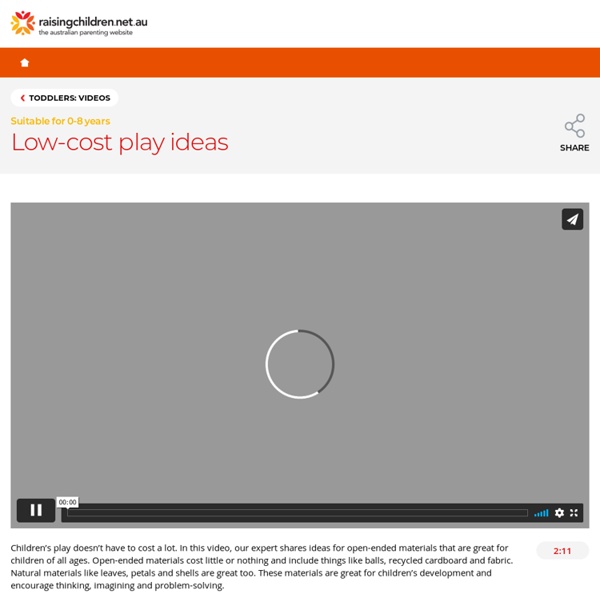



https://raisingchildren.net.au/toddlers/videos/low-cost-play-ideas
Related: English in early childhood • English in early childhood • katyjo78 • miss_naomi • English to Early Childhood Kids5 ways to win over parents to the importance of play in international EYFS "I’m not sending my child to school for them play all day. They should be learning properly!" Have you ever overheard comments like this? Or read something similar on social media? Perhaps your teaching methods are questioned during parent-teacher conferences? The cognitive benefits of play: Effects on the learning brain © 2008 - 2014, Gwen Dewar, Ph.D., all rights reserved Science supports many of our intuitions about the benefits of play. Playful behavior appears to have positive effects on the brain and on a child’s ability to learn.
Building on what children know (free article) - Early Childhood Australia ‘Take the child on from where they are now’ has long been a slogan in early childhood, but I wonder, as educators, if we always do it? My four-year-old granddaughter, Mia, is extremely capable with modern technologies; she can use a mobile phone and digital camera and browse a DVD to select particular scenes in a movie. She is not ‘print literate’, but she is ‘techno-literate’. I’m not advocating techno-skills for babies, but I am conscious that this competence may not be valued as she goes into preschool. She may well be told ‘that’s ok at home, but we do things differently here’.
Out now: a free information book explaining the coronavirus to children, illustrated by Gruffalo illustrator Axel Scheffler - Nosy Crow Axel Scheffler has illustrated a digital book for primary school age children, free for anyone to read on screen or print out, about the coronavirus and the measures taken to control it. Published by Nosy Crow, and written by staff within the company, the book has had expert input: Professor Graham Medley of the London School of Hygiene & Tropical Medicine acted as a consultant, and the company also had advice from two head teachers and a child psychologist. The book answers key questions in simple language appropriate for 5 to 9 year olds:
Primary school shake-up to focus on ‘play-led’ learning Children at primary schools would not study traditional subjects until as late as 10 years of age, under proposals being considered by policymakers. Instead, there would be a much greater emphasis on creative play during the early years of primary school, and broader areas of learning in later years. The reforms are based loosely on some of the features of top-performing education systems in countries such as Finland, as well as new research on how children learn.
This ‘Kindness Curriculum’ Is Free And Should Be Used In Every Classroom Imagine living in a world that valued kindness enough to teach it along with academics. Educators would teach kids to manage their emotions in addition to standard curriculum such as math and science. Sounds pretty amazing, doesn’t it? Well, the Center for Healthy Minds at the University of Wisconsin-Madison has created a free “kindness curriculum” for kids, designed to do just that. It’s a mindfulness-based curriculum for preschoolers that will bring kindness into the classroom. “Faced with mental and physical health challenges at a global scale, we conduct rigorous scientific research to bring new insights and tools aimed at improving the wellbeing of people of all backgrounds and ages,” states the Center’s mission statement.
Why Movement is Essential in Early Childhood With so few years under their belts, my 3- and 6-year-old daughters are still learning to inhabit their bodies. They are learning how to maneuver themselves physically, how to orient themselves in space. As Vanessa Durand, a pediatrician at St.
Observation, Assessment and Planning - Early Years Matters The EYFS Profile summarises and describes children’s attainment at the end of the EYFS. It is based on on-going observation and assessment in the three prime and four specific areas of learning, and the three learning characteristics, set out below: The prime areas of learning: • communication and language • physical development 21 of the Best Early Years Books for International Friendship Day We know that skills like empathy aren’t fully developed until later in a child’s life, which is why there are so many stories on friendship and how to treat people aimed at Early Years. International Friendship Day, then, is a great opportunity to share some of these amazing books with your children. It does, however, fall on Sunday 30 July. So celebrating on the day itself is going to be difficult, doubly so for Reception classes who are on summer holidays.